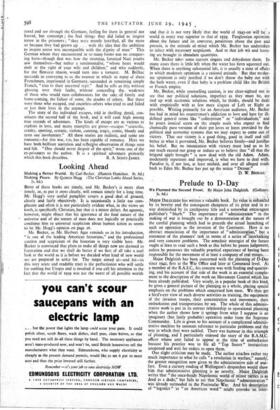Looking Ahead
Making a Better World. By Carl Becker. (Hamish Hamilton. 8s. bd.) Making Peace. By Quintin Hogg 4The Christian Looks Ahead Series. 2s. 6d.) BOTH of these books are timely, and Mr. Becker's is more than timely, or, to put it snore clearly, will remain timely for a long time. Mr. Hogg's very useful pamphlet comers a good deal of ground, clearly and fairly objectively. It is occasionally a little too com- placent and often it is not particularly evident what, in the views set forth, is specifically Christian, but that is a minor defect. An agnostic, however, might object that his ignorance of the final nature of the universe and of the 'natureof man does, not logically or practically condemn him to universal scepticism about human action as seems to be Mr. Hogg's opinion on page 16.
Mr. Becker, as Mr. Herbert Agar reminds us in his introduction, "is one of the leading American historians," and the professional caution and scepticism of the historian is very visible here. Mr. Becker is convinced that plans-to make all things new are doomed to frustration and that we shall do better if we first of all take a cool look at the world as it is before we decided what kind of new world we- are prepared to serne for. The target aimed at—and hit—in this very acute and readable tract is the perfectionist who will settle for nothing but Utopia and is insulted if you call his attention to the fact that the world of 1939 was not the worst of all possible worlds
and that it is not very likely that the world of 1945-on will be a world in every way superior to that of 1939. Panglossian optimism about, the future and its converse, pessimism about the past and present, is the attitude of mind which Mr. Becker has undertaken to infect with necessary scepticism. And to that job wit and learn- ing are brought in abundant quantities.
Mr. Becker takes some current slogans and dehydrates them. In many cases there is little left when the water has been squeezed out. When there is anything substantial left, it is usually a state of affairs in which moderate optimism is a rational attitude. But that moder- ate optimism is only justified if we don't throw the baby out with the bath water, even if that baby is a problem child like the British or French empire.
Mr. Becker, while counselling caution, is too clear-sighted not to see that our political solutions, imperfect as they 'must be' are tied up with economic solutions which, he thinks, should be dealt with empirically with as few mere slogans of Left or Right as possible. Writing primarily for an American audience, Mr. Becker has had in mind his countrymen's addiction to love and hate for ill- defined general terms like " collectivism " or "individualism," and he pours ironical scorn on the simple souls who expect to find chemically pure versions of their pet loves or hates provided by the political and economic systems that we may expect to come out of victory. That our victory is a good thing, good in itself and still better in what it prevented, Mr. Becker believes firmly—and justifies his belief. But no intoxication with victory must lead us to let our reach exceed our grasp or induce us to believe that "all that the brigand apple brought" is now dead with the old Adam. Adam, moderately repentant and improved, is what we have to deal with. Paradise is, if not lost, at least mislaid, and over all alleged roads back to Eden Mr. Becker has put up the notice "Detour."
D. W. Bitocm.


























 Previous page
Previous page